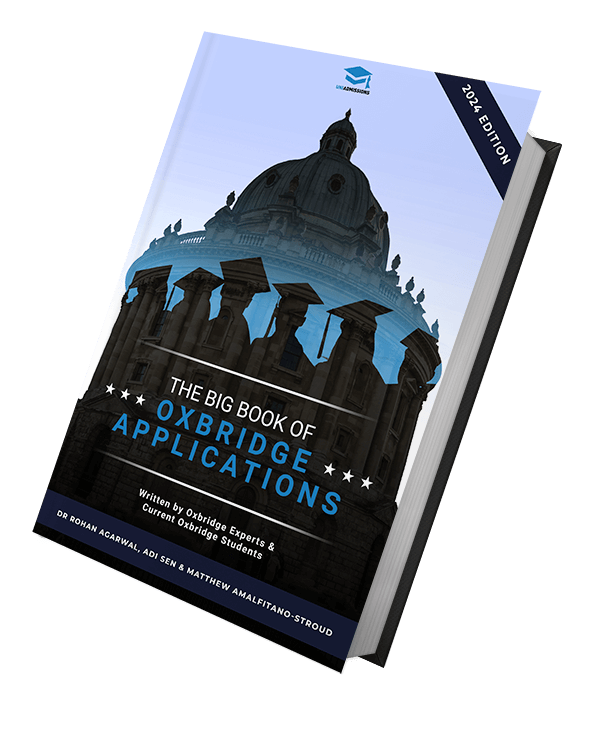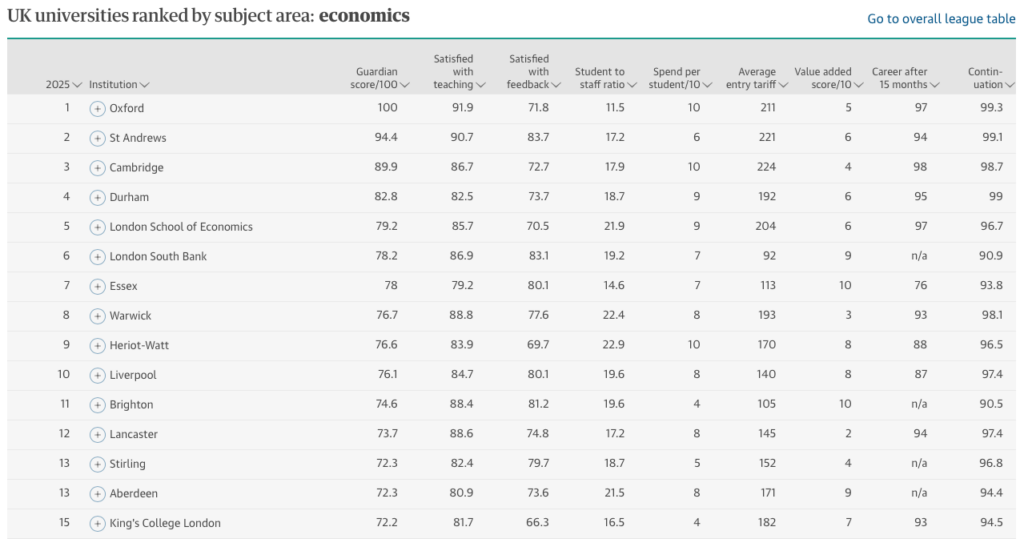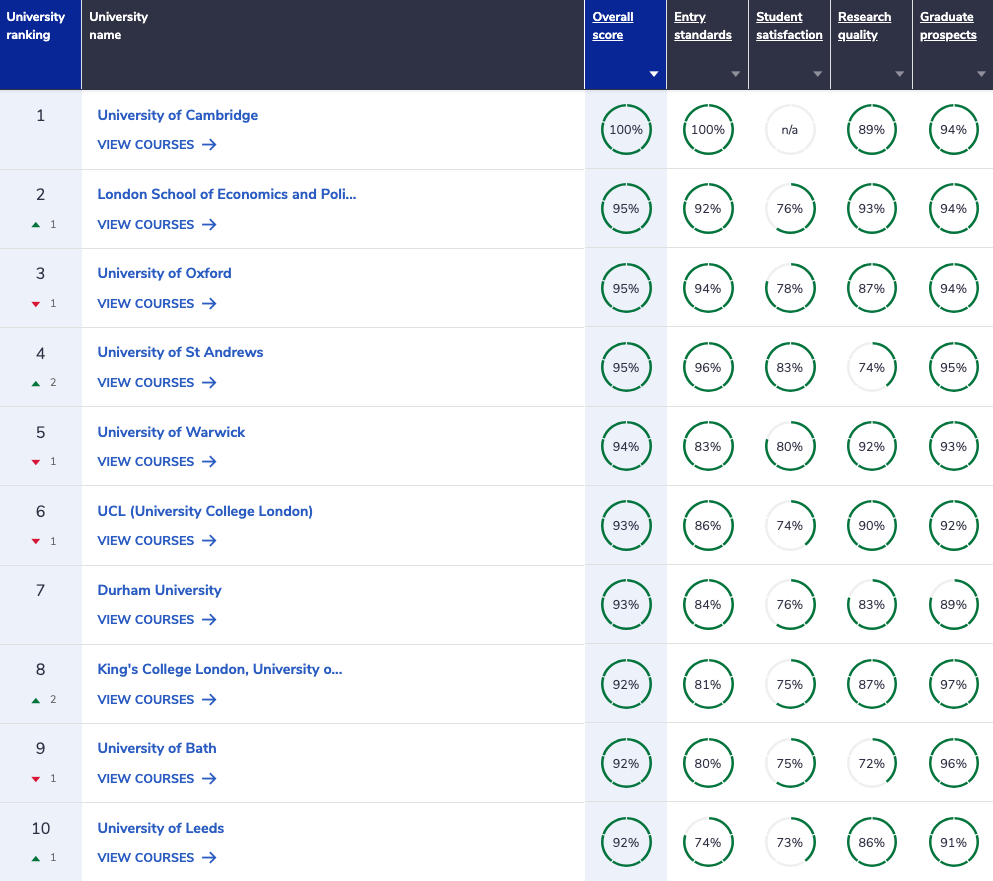The UK university rankings are a popular way to assess all the courses available in a given subject. These lists will rank universities from best to worst based on a number of factors relating to admissions, student experience, employability and more. But how trust-worthy are these lists?
From this prospective students gain valuable insight into the courses and the universities.The UK Economics rankings vary according to your source, so it is essential to know what to look out for.
In this guide, we’ll learn about how the two main university rankings are made, what this years results look like and what you should consider when looking at ranking tables. Let’s get started!
Who Makes The economics rankings?
There are a number of different ranking guides which compile their lists using different measuring factors. The Guardian and The Complete University Guide are two of the most popular organisations that compile lists of the best universities for lots of courses.
Of course, they are not the only league tables for Economics out there. A quick Google search will give you many options to compare against one another.
Aiming for a career in Economics after you graduate? We’ll help you secure your dream Economics offer first.
Writing the perfect Personal Statement, scoring highly on the TMUA or TSA and interviewing like a pro is how you get your dream Oxbridge Economics offer.
Discover our Full-Blue Economics Programme for comprehensive admissions support by clicking the button below to enrol and triple your chances of success.
The Guardian Economics Rankings
To compile their list of Economics courses in the UK, The Guardian uses the following headings:
Guardian score/100 – rating of excellence based on a combination of the other factors.
Satisfied with the course – the rating of the overall quality of the course, given by final-year students in the latest National Students Survey (NSS) given as a percentage.
Satisfied with the teaching – the rating of the quality of teaching on the course given by final-year students in the latest NSS.
Satisfied with feedback – the rating of the feedback and assessment, given by final-year students in the latest NSS.
Student to staff ratio – number of students per member of teaching staff.
Spend-per student/10 – money spent on each student, excluding academic staff costs, given as a rating out of ten.
Average entry tariff – typical UCAS scores of young entrants to the department.
Value-added score/10 – this score compares students’ degree results with their entry qualifications, to show how effectively they are taught – given as a score out of ten.
Career after 15 months – percentage of graduates who find graduate-level jobs, or are in further study at professional or higher education level, within 15 months of graduation.
Continuation – percentage of first-year students continuing to second-year.
The Guardian bases the scores for each of these metrics on data collected from the National Student Survey (NSS) and the universities themselves. While this means that much of the ranking is based on subjective statistics, there is still a level of subjectivity that goes into the data interpretation. However, it would be untrue to say the table is biased in any way.
The Guardian Economics University Rankings 2025
Below are the top 25 entries of The Guardian’s league table, displaying the results for 2025 and a comparison to 2024’s results:
| Postition | University | Previous Position (2024) |
|---|---|---|
| 1 | University of Oxford | 1 (=) |
| 1 | University of St. Andrews | 2 (=) |
| 3 | University of Cambridge | 3 (=) |
| 4 | Durham University | 5 (>1) |
| 5 | London School of Economics | 6 (>1) |
| 6 | London South Bank University | 10 (>4) |
| 7 | University of Essex | 7 (>1) |
| 8 | University of Warwick | 8 (=) |
| 9 | Herriot-Watt University | 14 (>5) |
| 10 | University of Liverpool | 13 (>3) |
| 11 | University of Brighton | 4 (<7) |
| 12 | Lancaster University | 31 (>19) |
| 13 (=) | University of Stirling | 15 (>2) |
| 13 (=) | University of Aberdeen | 21 (>8 |
| 15 | King’s College London | 9 (<6) |
| 16 | University College London (UCL) | 16 (=) |
| 17 | Aston University | 32 (>15) |
| 18 | Ulster University | 23 (>5) |
| 19 (=) | University of Huddersfield | 27 (>8) |
| 19 (=) | University of Bath | 25 (>6) |
| 21 | University of Birmingham | 18 (<3) |
| 22 | University of Nottingham | 33 (>11) |
| 23 | University of East Anglia (UEA) | 20 (<3) |
| 24 | University of Portsmouth | 22 (<2) |
| 25 | Swansea University | 11 (<24) |
The University of Oxford once again takes the top spot in The Guardian’s Economics rankings. However, the entire top five has remained completely relatively unchanged from 2024 to 2025, barring one significant change. The University of Brighton had previously ranked 4th but has fallen to 11th, causing Durham to rise one place and LSE to enter the top five.
Beyond this, several universities saw large jumps in rankings, including Lancaster (31st – 12th), Aston (32nd – 17th) and Nottingham (33rd – 22nd). Inversely, Swansea saw a major drop of 24 places, falling from 11th to 25th, while Glasgow dropped from 12th to 31st. Other significant drops from 2024’s top 25 include Westminster (17th – 37th) and UWE Bristol (23rd – 52nd).
The Complete University Guide Economics Rankings
The second and equally well respect university league table is produced by The Complete University Guide. Their rankings are based on a slightly different set of criteria, although there is some overlap.
Overall score – the total score calculated by The Complete University Guide’s independent and trusted methodology.
Entry standards – the average UCAS tariff of new students entering university.
Student satisfaction – a guide to how satisfied students are with the quality of teaching they receive.
Research quality – a measure of the quality of the research undertaken by the university.
Research intensity – a measure of the proportion of staff involved in high-quality research at the university.
Graduate prospects – outcomes – a guide to the success of graduates after leaving university.
Graduate prospects – on track – a measure of whether recent graduates agree that their current activity fits with their future plans.
Complete University Guide tends to gather its data from the same sources; the NSS and university first-hand data. However, the interpretation and subsequent usage in scoring differ for The Guardian, which is why we see fairly different results between the two tables.
Complete University Guide Economics University Ranking Table 2025
Below are the top 25 entries Complete University Guide ranking table, displaying the results for 2025 and a comparison to 2024’s results:
| Postition | University | Previous Position (2024) |
|---|---|---|
| 1 | University of Cambridge | 1st (=) |
| 2 | London School of Economics | 3rd (>1) |
| 3 | University of Oxford | 2nd (>1) |
| 4 | University of St. Andrews | 6th (>2) |
| 5 | University of Warwick | 4th (<1) |
| 6 | University College London (UCL) | 5th (<1) |
| 7 | Durham University | 7th (=) |
| 8 | King’s College London | 10th (>2) |
| 9 | University of Bath | 8th (<1) |
| 10 | University of Leeds | 11th (>1) |
| 11 | University of Bristol | 15th (>4) |
| 12 | University of Nottingham | 13th (>1) |
| 13 | University of Edinburgh | 12th (<1) |
| 14 | University of Exeter | 9th (<5) |
| 15 | University of Glasgow | 14th (<1) |
| 16 | Lancaster University | 19th (>3) |
| 17 | University of Birmingham | 16th (<1) |
| 18 | University of Manchester | 21st (>3) |
| 19 | University of York | 23rd (>4) |
| 20 | Loughborough University | 17th (<3) |
| 21 | Queen Mary University of London | 26th (>5) |
| 22 | University of Sheffield | 18th (<4) |
| 23 | University of Surrey | 20th (<3) |
| 24 | University of Liverpool | 27th (>3) |
| 25 | Cardiff University | 29th (>4) |
The Complete University Guide ranked Cambridge and Oxford at 1st and 3rd respectively, with LSE placed in between. Cambridge was previously ranked 1st in 2024, so it’s managed to hold the top spot. Overall, the selection of universities here is fairly similar to The Guardian, though there are a few differences and exclusions.
Overall, the placements on the list held fairly steady from last year’s results. The position change was shared by the University of Exeter, which dropped five places, and Queen Mary University of London, which rose by five places. More significant changes can be seen lower down in the list from universities like Lincoln and Bradford, but the top 25 were mostly unaffected.
Access "The Big Book Of Oxbridge Applications" For FREE
Considering studying Economics at Cambridge or E&M at Oxford? Download The Big Book Of Oxbridge Applications for free here to discover everything you need to know about Oxbridge Economics and its application process. Through over 350 pages, you’ll find:
- Over 40 admissions test practice questions
- 28 example Oxbridge Personal Statements
- Interviews with Oxbridge students and graduates
- Additional downloadable resources
Fill in your details below to claim your digital copy today!

The Best and Worst UK Universities For Economics
Before we look at the results, it’s important to remember that the title of “best” and “worst” universities is not at all definitive. While these universities rank where they are due to the interpretation of the data collected for these tables, there are still plenty of considerations for each university that can’t be quantified and will be different for each applicant.
With that being said, let’s take a look at the top five and bottom five entries of each table:
Best Universities For Economics UK
Firstly, looking at the best Economics universities on these lists, we can see that there’s a clear consensus across both lists. On both tables, there were very few position changes in the top five universities (The Guardian’s top five remains the exact same as 2023) and very little variance of entires between the lists.
Let’s look at the top five UK economics universities for each list:
Complete University Guide
- University of Cambridge
- London School of Economics
- University of Oxford
- University of St. Andrews
- University of Warwick
The Guardian
- University of Oxford
- University of St. Andrews
- University of Cambridge
- Durham University
- London School of Economics (LSE)
Between the two lists, there are four shared universities (though in different positions), with almost all of the entries being members of the Russell Group (this isn’t surprising considering how highly they generally rank).
St. Andrews is the only non-Russell Group university, as well as the only Scottish university in the top ten of either list, though Edinburgh, Glasgow and Dundee each perform well across the two tables.
The only different universities between the two lists are Warwick and Durham. The Guardian ranked Warwick in 8th, while Complete University Guide placed Durham in 7th, so both were still highly regarded in both lists.

Worst Universities For Economics UK
These universities are the worst in the sense of what data states as fact but remember that there are far more factors to consider beyond the numbers. If you’re considering one of the universities, don’t be immediately discouraged by the rankings. Do your own research and see why they may have gotten the placements they did.
Here are the lowest-ranked Economics universities in the UK in ascending order:
Complete University Guide
- University of Winchester
- De Montford University
- Goldsmiths, University of London
- London Metropolitan University
- University of Northampton
The Guardian
- Brunel University
- De Montford University
- Bournemouth University
- University of Greenwich
- Queen's University Belfast
As usual, there’s not much consistency between the two rankings at the bottom end, though De Montford is seen as the second-lowest-ranked university on each list. Beyond this, each list also has two London-based universities.
The most surprising entry on either of these lists is a Russell Group appearing in the bottom five, with Queen’s University Belfast ranking 69th on The Guardian’s list. Queen’s is typically one of the weaker universities in the Russell Group based on rankings, but it’s rare for it to appear this low on a list. Complete University Guide ranked Queen’s in 27th, meaning it narrowly missed the top 25. This shows how varied these rankings can be and why you shouldn’t take one table as the definitive verdict on these universities.
Which Ranking Table Should I Follow?
As for which ranking table you should follow, that depends on what is most important to you. For example, you may place more importance on ’spend per student’ or career prospects.
The Guardian has created their own way of ranking universities which is largely based on student perspective and The Complete University Guide, on the other hand, puts focus on research, employment and student satisfaction.
It can be easy to get carried away with all these different ratings and rankings of the Economics courses in the UK. While it is true that these differences may affect your experience at university, you should keep in mind that all of the courses are at highly rated universities with excellent rankings across the board.
However, it is crucial to remember that no matter which university you attend, you will graduate with the future of a highly respected career which is boundless in its opportunities. So do not get worried if you end up attending a university not at the very top of the list.
Ultimately, it is a matter of what you are looking for in a university when it comes to deciding which one to apply for.
Conclusion
What is most important to remember is that these rankings should only be taken into consideration – don’t make a decision based upon them. Instead, use them as a stepping stone to do further research and determine which universities meet your personal requirements.
The rankings establish the best performing universities but ultimately, what is ideal for other applicants will differ from what is ideal for you, so consider the rankings but make sure to form your own opinions.
Worried about your Oxbridge chances? Our offer success rate is 57%
Applying to Oxbridge is immensely competitive and it is crucial that you give yourself the best chance of success. We help you craft the perfect Personal Statement, achieve a highly competitive Admissions Test score and teach you how to Interview effectively – covering all areas of your Oxbridge application.
Discover our Full-Blue Economics Programme today to triple your chances of success in your application.









